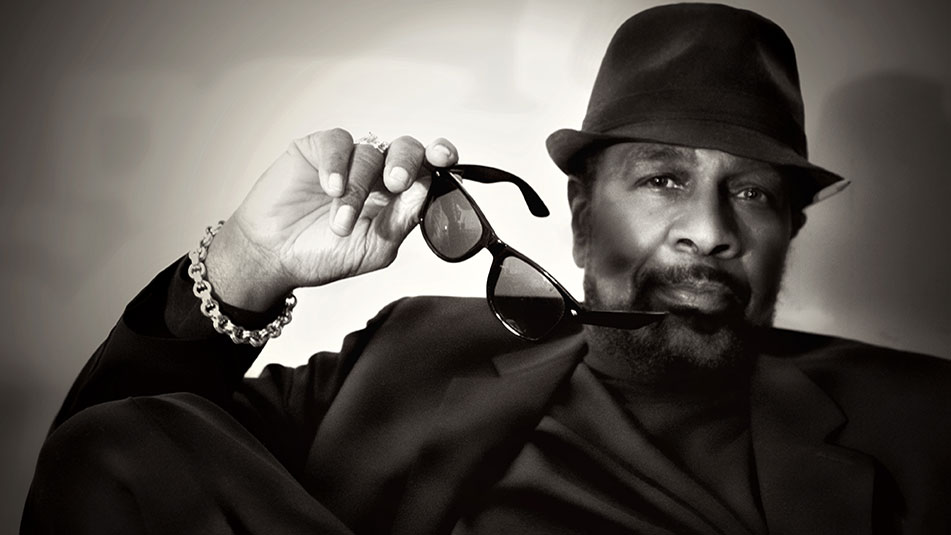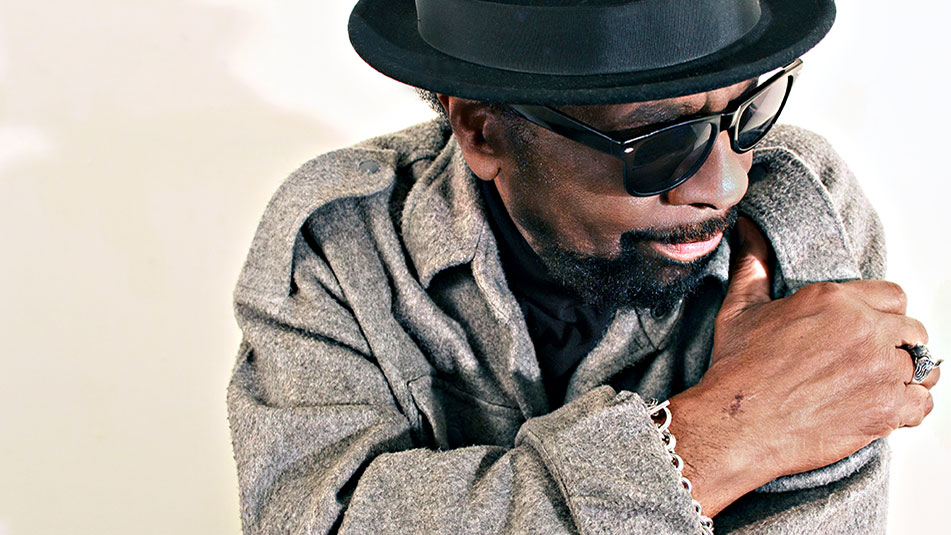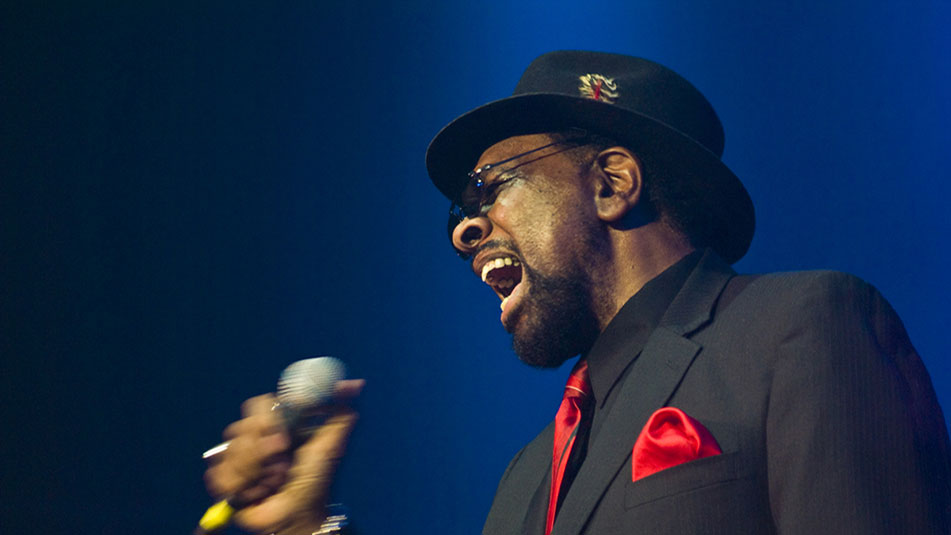This Is Where I Live: A Q&A With William Bell
May 30, 2019 | by Richard Scheinin
 Two years ago, William Bell — at age 77 — won a GRAMMY award for his album This is Where I Live. Its title song reflects on his 60-plus years in music: “That to me is my life,” he explains, speaking from his home in Atlanta, “and this is where I live, in the music.”
Two years ago, William Bell — at age 77 — won a GRAMMY award for his album This is Where I Live. Its title song reflects on his 60-plus years in music: “That to me is my life,” he explains, speaking from his home in Atlanta, “and this is where I live, in the music.”
Bell, who brings his 10-piece band to SFJAZZ on June 20, is best known as the composer of “You Don’t Miss Your Water,” a cornerstone of Southern soul, which he recorded for Stax Records in 1961 and which later was covered by Otis Redding, the Byrds and Jerry Lee Lewis. In 1967, he and childhood friend Booker T. Jones — of Booker T. and the M.G.’s – co-composed an instant classic for Albert King: “Born Under a Bad Sign,” covered a year later by Cream. When Bell’s story is told, those two songs typically stand out as the pillars that define his 60-plus years of singing, composing and producing.
But there’s so much more to it. Born in 1939, he grew up in Memphis, singing in church, and by age 14 was singing jazz standards with a big band led by drummer Phineas Newborn, Sr., known to Bell as “Old Man Phineas.” (The drummer’s son, pianist Phineas Newborn, Jr., was also in the band.) As a youngster, Bell performed with a long list of jazz, blues and rhythm-and-blues greats, including Charles Lloyd, B.B. King and Rufus Thomas. As a teenager, he sang doo-wop under the streetlights with two other kids from his neighborhood: Maurice White (who would go on to found Earth, Wind & Fire) and David Porter (the future co-composer of “Soul Man” and “Hold On, I’m Comin’,” the hits by Sam and Dave). At age 20, Bell signed with Stax Records, whose founders Jim Stewart and Estelle Stewart Axton were like surrogate parents to the singer. Their recording studio at 926 East McLemore Avenue in Memphis was Bell’s second home. In 2016, it was a resuscitated Stax that released This is Where I Live, and Bell still describes the label as “my heart.”
Peter Guralnick, author of Sweet Soul Music: Rhythm and Blues and the Southern Dream of Freedom, once described Bell as “perhaps the most underrated of all the major soul singers.” But Bell – who turns 80 in July – seems unconcerned; he counts himself a lucky man. We spoke to him for an hour – and felt lucky, listening to his stories.
Q: You’re so closely associated with Southern soul music – not too many people know you came up singing jazz.
A: That’s true. I began singing with Old Man Phineas’s big band when I was 14 years old. We did all the standards: “Moonlight in Vermont,” “A Pretty Girl is Like a Melody” — oh, and “Unforgettable” by Nat King Cole! He and Arthur Prysock and a lot of singers were on the scene, and those were the kinds of tunes we did.
Q: Did Old Man Phineas have the top Memphis players in his band?
A: Sure. He had 14 pieces and some of the great jazz players came through that band: Charles Lloyd, the saxophonist, of course, and Phineas Jr. was there on keyboards. Calvin (Newborn) was on guitar and Wanda Jones, his wife, was on trombone. And then he had Hank Crawford in there — that’s where Ray Charles found Hank Crawford, in Old Man Phineas’s band. So I got schooled with some of the greats.
Q: When you were a kid, did it seem natural to cross the lines between jazz and blues and gospel and so forth? The Memphis music scene was fluid?
A: Oh yes, we heard all kinds of music growing up in Memphis. On the radio, you’d hear blues for an hour and jazz for an hour and then you’d hear country and gospel. So we heard it all and the lines were always blurred.
I started in church, of course. From around seven years old, I was singing in the choir. And by nine, I was singing solo with the choir behind me.
I was kind of like a prodigy. By the time I was 14, 15, everybody on Beale Street knew me, including B.B. (King), Junior Parker, Bobby Bland and all those guys. They’d let me sit backstage and listen to the acts. They all knew me from my working with Old Man Phineas at the Flamingo Room, which was about a block down from Beale on Hernando Street.

Q: When you bring your current band to San Francisco, will you sing any standards or blues tunes?
A: Mostly people want to hear the soul music thing. Sometimes we do stuff by Ray Charles, or something by Joe Williams – “Every Day I Have the Blues.” Not a lot of it, but we do it.
We run the gamut. We’ll do some of my newer tunes from This is Where I Live, and we’ll do a lot of the earlier Stax things: “You Don’t Miss Your Water,” “I Forgot to Be Your Lover,” “Every Day Will Be Like a Holiday” – those standard songs from the William Bell days during the Stax era. Then we do “Born Under A Bad Sign,” which I wrote with Booker for Albert King.
Q: You’ve got a four-piece horn section and three backup singers. How long has the band been together?
A: I’ve had the same band for 15 or 16 years now. My bandleader is Tyrone Holmes, the baritone sax player. He and Maceo (Parker) – who played with James Brown – they were college roommates. So Tyrone is familiar with all kinds of music. It’s a very good band and – I find this interesting — my audience now covers three generations. We’ve got the grandparents and their children and then the younger kids, too. Everyone seems to enjoy the music; I think it retains some of the essence of the early Stax days.
Q: At Stax, during the ‘60s, you were a team player. Aside from recording your own tunes, you seemed to know how to write songs that made other people sound good.
A: I was kind of like a utility person. I was signed to Stax as a recording artist; I was not supposed to be the writer or the producer. But when Jim Stewart found out I could do all those other things, I started taking on different roles. That’s why I wrote songs for Ollie and the Nightingales, and for Albert King and Rufus Thomas, too.
Q: You’ve said that Rufus Thomas was like a father to you.
A: I knew him since I was a kid. He and his band used to play at the Palace Theatre on Wednesday nights on Beale Street. It was one of those midnight ramble things, and Rufus was mainly a dancer and a comedian in those days. But he also was a deejay on the radio at WDIA, which was one of the first black radio stations in the country, and then he had a band called the Bear Cats. They backed me up on my first record, “Alone on a Rainy Night,” which I recorded (in 1957) with the Del Rios, my doo-wop group. So Rufus and I had known each other a long time, and I knew his children from when we were teenagers: Marvell and Carla Thomas went to Hamilton High School, which I attended for one year, and then I transferred to Booker T. Washington High School.
Q: Who else went to Booker T. Washington?
A: Al Jackson, the drummer, and Booker T. Jones, of course – and Maurice White. We all lived in the same neighborhood. David Porter, Maurice White and I all lived within a couple of blocks of each other – we all came out of LeMoyne Gardens, which was a housing project there. And in the nighttime, we’d sing under the streetlights. I’m telling you, we would have sessions out there until the neighbors would run us in! Yeah, Maurice, David and I, we would do all those doo-wop songs by the Flamingos and Billy Ward and the Dominos and all those old ‘50s songs.
Q: Did you know Isaac Hayes?
A: Isaac went to Manassas High School. But I knew Isaac, because he was around town a lot as a kid. And then when we started hanging out at Jim Stewart’s place — over at Stax — he was always there. He must’ve been 15.
Q: You were just two or three years older. How old were you when you composed “You Don’t Miss Your Water?”
A: I was 17.
Q: You must’ve been an old soul. It feels like a song that comes from a lot of reflecting on life.
A: I was an only child until I was 10 years old, so I was always around grownups. Sometimes during the summer I would go down to Mississippi for a couple of weeks to my grandfather’s farm, and I was always listening to these old sayings. My grandfather was always saying things like “you don’t miss your water until your well runs dry.” Or he’d say, “That fellow was born under a bad sign.” You hear those things, and I think it just seeps in when you’re a child. It kind of stuck with me and when I started writing, I would pull from some of those old sayings.
Q: You were on the road when you composed “You Don’t Miss Your Water?”
A: I was touring with Old Man Phineas’s band and we were in New York and we had a couple of days off and I was in the hotel one weekend, one Sunday night. And it was raining and storming and I was missing home and missing my girlfriend at home. I was just missing stuff, and of course one of those old sayings came up: “You don’t miss your water until your well runs dry.” And when I got back into Memphis, I got with the piano and figured out some of the chord structures for that thing. And, of course, it came out really gospel-y, because that’s where I started out; it’s where I’m from, the church.
Q: How old were you when you recorded the tune?
A: I was 21. Marvell (Thomas) played piano, and I believe it was Lewis Steinberg on bass; he was one of the early M.G.’s. And then, since it was so gospel-y, they wanted to get some organ on it. So of course they asked Booker; his family and my family went to the same church, Mt. Olive Cathedral. So that’s what happened. The record came out in ’61, I believe in the latter part of November, and it got some play around Memphis. During Christmas time, the jocks would still give it a spin and it was coming out of all the clubs on Beale Street, out of the jukeboxes. And then in January all the stations started picking it up and it just mushroomed from there.
Q: Your recent songs – “This Is Where I Live,” “Poison In the Well,” “The Three of Me” – also have a very reflective quality about them. You’re singing about real things.
A: I’m a person that usually writes about my personal experiences or from observation. So even if it’s hypothetical, I write truthfully, because I think that’s how people can relate to a song — through the lyrics. So I just write from past experience. Say, for instance, “Poison in the Well.” Sometimes you get into a bad relationship and you fall in love. You know it’s bad for you, but you somehow can’t just leave it right away. You know the water’s no good, but you keep coming back for it.
Q: You begin “This Is Where I Live” by singing a “la, la, la” chorus, sounding like Sam Cooke.
A: That’s right. Because I became a Sam Cooke fan when I was doing gospel in the church and I followed his career with the Soul Stirrers and then when he went secular. And later, when I had a hit record, I got to meet him. So I’ve had this wonderful life, a very colorful life, getting to meet a lot of iconic people that most kids only get to read about. For instance, I lived in New York with Phineas (Newborn), Jr., for almost a year – this must’ve been in the late ‘50s or early ‘60s. He had a trio and there was a club – I believe it was called the High Hat — out in Hicksville, Long Island, and we worked out there three nights a week. And living back in Manhattan, I’d hang out at a club called Slugs’, over by the river.
Q: We seem to have returned to your secret jazz life. You’re saying that you used to hang out at Slugs’ in the East Village? Everybody played there: Sun Ra, Jackie McLean, Lee Morgan. Who did you see there?
A: All the iconic musicians would jam; late at night, they’d drop in. As a young kid, you’d just sit there with your jaw dropping. The one that really impressed me was Yusef (Lateef); to see a person playing more than one horn at a time, in harmony — that just blew my mind! I also met Joe Williams — not at Slugs’, but at one of the hotels where we went by and caught one of his sets. And I knew him for a long time and when I moved to Atlanta, I found out that he was originally from Georgia, and I was instrumental in getting him into the Georgia Music Hall of Fame.
Q: What instruments do you play? Do you compose at the piano?
A: I took piano as a boy — when I didn’t sneak away and go to ball games! Mom played, so I took piano, and if I were to have practiced more, I could play better now. I caught enough to write songs. And I’m left-handed and I taught myself to play guitar – unorthodox — and I play enough guitar to sometimes write songs there too. I tell musicians I don’t consider myself a real musician. But I studied theory and harmonies in songs. I know more music than I’m able to sit down and execute, but I’m able to communicate with good musicians.
Q: Are you still composing?
A: As we speak, I’m writing for a new project. I’m about six songs into it right now.
Q: You’re getting ready to make a new album?
A: It’ll probably be out next year.
Q: Will it be on Stax, like your last one?
A: I’m in a good place right now, winning a GRAMMY with the last album. I’ve had a couple of offers from labels, which I haven’t accepted. As for Stax — that’s my heart, but I don’t know yet.

Q: On the last album, you have a song called “The Three of Me.” You sing about “the man I was, the man I am, and the man I want to be.” You’re about to turn 80, but it seems like you’re still looking toward the future.
A: That’s one of the things of having longevity – I’m never really totally satisfied, and I always strive for a new plateau to conquer. For instance, I started acting for two years with the Academy Theatre here in Atlanta. I did some summer stock things when I moved here.
Q: I’ve read that you played the role of Stanley Kowalski in “A Streetcar Named Desire.”
A: Yes, that was a summer stock thing — I was one of the first black Polish people! And I have done some bit movies, as well, and some were left on the cutting room floor. I got a lot of good scripts during what they called the “Blaxploitation” days in the early ‘70s, and they all wanted me to play pimps and hustlers, and I didn’t ever want to do that. And I was lucky enough to have a plan B — or a plan A — with my music. But I would still love to get a really good script that I could sink my teeth into for a good movie role.
Q: It seems like you’ve been learning new skills all your life. You’ve always said that working and recording at Stax in the ‘60s was like going to a university.
A: I tell people all the time: “God bless Jim Stewart and Estelle Axton Stewart.” Because that was a time when it was not really fashionable for the races to get together and communicate like that. And they allowed us kids to come in and hone a craft and make a career out of it. It was like going to school. We would sit there and learn to write a good song in three verses or less and tie it in with a bridge and just improve on our musical abilities, out natural God-given gifts. And for me, having that experience, I couldn’t have paid for that, going to a college. So that’s why I say it was like going to a university. We learned so much at 926 East McLemore Avenue.
A staff writer at SFJAZZ, Richard Scheinin is a lifelong journalist. He was the San Jose Mercury News' classical music and jazz critic for more than a decade and has profiled scores of public figures, from Ike Turner to Tony La Russa and the Dalai Lama.
